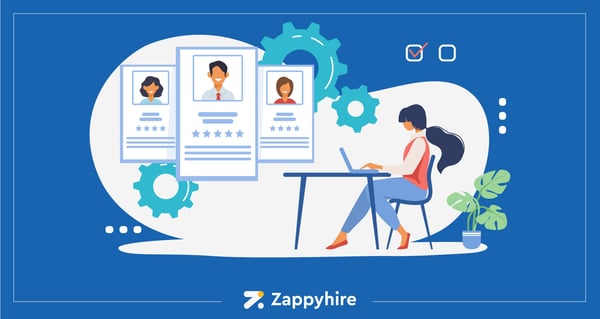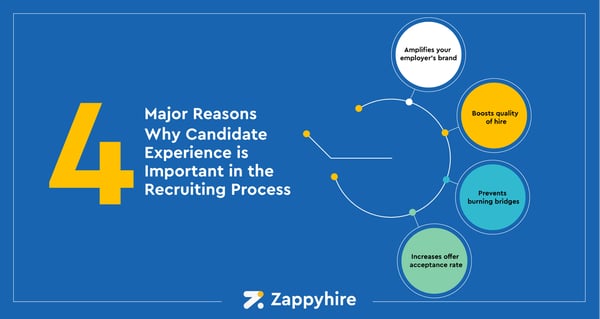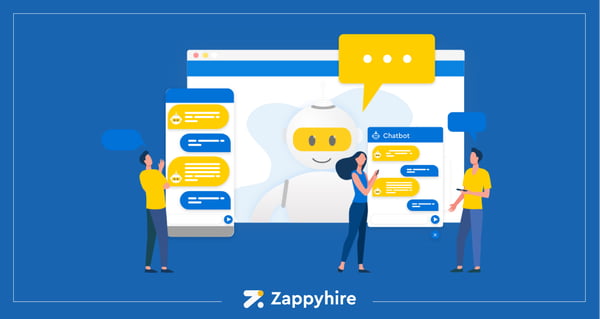September 14, 2022
 by Varshini Ravi / September 14, 2022
by Varshini Ravi / September 14, 2022

The world is powered by the experience economy, and it's time to take that to heart when it comes to recruiting.
And when it comes to your hiring process, you should never forget that the candidate's experience is just as important as the candidate itself.
Companies are increasingly adopting recruiting automation tools to help streamline their hiring, but did you know that candidate experience is often overlooked?
Think about it: when you have a candidate whose experience economy was so bad they would never recommend your company, they're going to tell everyone they know how awful their experience was.
And if they don't say anything? They'll probably still have that negative impression in their mind when they see other job opportunities come up.
The consequences of this are drastic: not only does it make candidates feel like they're being treated like numbers on a spreadsheet rather than human beings with their own stories to tell, but it also means you're missing out on some of the best candidates out there.
In fact, your candidate experience is so important that it can be one of your most important key performance indicators (KPIs): the Candidate Net Promoter Score (NPS). NPS is a measure of how likely candidates are to recommend your company to others based on their perceptions about how well you treat them during the hiring process. It's a critical way to understand how well your company is doing at attracting and retaining talent.
Fortunately, there are tools that help automate recruitment processes and improve the candidate experience by saving time and money on manual workflows, automating repetitive tasks, and creating custom workflows based on different roles in your organization.
The term recruiting automation sounds self-explanatory. However, anyone that has ever managed a hiring process knows how manual and difficult recruiting can be.

Recruiting automation refers to using software to automate and streamline your recruiting processes. The goal of using this software is to reduce manual tasks that can be done more efficiently by technology, free up recruiters’ time, and empower them with data that facilitates well-informed hiring decisions.
The candidate experience is more than just a certain part of the recruiting process. It's the overall experience that candidates have with your company, from initial outreach to the final hiring decision. Due to this, it's important for companies to invest in their candidate experience.
The candidate experience isn't just about keeping a job listing active and posting open roles on social media. It's about making sure candidates see the value in applying for your open positions and understand what it would be like to work at your company. A positive candidate experience can increase conversion rates on job postings.
Hiring the right people can benefit your company in a number of ways. The right candidate can bring an influx of new ideas to your team and help you navigate changes in your industry.
Additionally, if you're looking to save money in the long term by having employees who stick around for longer, a good candidate experience is essential for creating a company culture that will keep employees satisfied and engaged.
In order to improve your bottom line, you need to put forward candidate experience best practices and think about how to attract top talent, plan to prepare them for the job, and provide support during their first few weeks on the job.
Every touchpoint in your process has an impact on your candidate experience, from the ease of applying online to how quickly you respond to inquiries. Hence, a positive and personalized experience throughout the hiring process is critical to a company's success.
The candidate experience in recruitment is critical to your business. It gives candidates a glimpse into your company culture, sets expectations, and can either make or break the deal.
A poor candidate experience could deter people from applying for open positions and can even lead them away from working with your company altogether. A bad interview process or impersonal communication can turn off applicants and make them think twice about working at an organization.
of job seekers who read a negative review will decide against applying at that company.
Source: CareerArc
A positive candidate experience will help you attract top talent who will be excited to work at your company and put their best foot forward during interviews and other interactions while applying.

Recruiting automation software gives you control over how you interact with candidates throughout their recruitment journey, which means you can ensure each and every candidate has a positive experience with your company. Here are some ways recruiting automation software can help improve your candidate experience and enhance your employer value proposition (EVP).
When a candidate feels like they were treated poorly during the interview process, this can create word-of-mouth publicity that could negatively impact your employer brand – even if they don't take another job offer elsewhere.
This can make them less likely to accept offers from you in the future and could also lead them to share their experiences with others, which could negatively impact your brand perception among potential candidates as well as current employees.
of candidates consider employer brand and reputation while applying for a job.
Source: CareerArc
In addition to improving engagement and retention, providing a positive candidate experience shows potential candidates that you're committed to hiring people who fit your culture and values. This can help strengthen your employer brand by making you seem more appealing as an employer in the eyes of job seekers.
Hiring automation helps improve the quality of hire because it allows recruiters to focus on finding candidates that are truly qualified for their roles, rather than spending time searching through unsuitable applications or managing irrelevant applicants who will never make it past their initial screening.
With better applicants in the pipeline, recruiters have more time to spend on each candidate's profile so they can make informed hiring decisions. This improves quality, saves time, and reduces attrition.
When a candidate doesn't get the job or isn't treated well during the interview process, it can have a negative impact on their perception of your company and brand. They may share their experience with friends or family members in the market for jobs in the future.
Today's candidates are more informed than ever before. They can find out more about the employer and job through the internet than they can ever get from a recruiter or hiring manager. They could retaliate by writing negative reviews online – or, in rare cases, even filing lawsuits. This could deter future hiring because, approximately 1 in 3 people turn down a job offer because of a review they read of the company online.
A positive candidate experience helps you to reduce offer drop outs. Several surveys have shown that when candidates feel like they've had a good experience, they're more likely to accept offers. In fact, CareerPlug reports that 80% of applicants were more likely to accept an offer if they had a positive experience.
When candidates have a good experience, they are more likely to accept offers and stay with your company longer. Think about it: would you want to work somewhere where you never felt valued or respected? Of course not! So don't make your candidates feel like they're being treated that way either.
Creating a positive candidate experience doesn't have to be difficult. Here are some smart ways to improve the candidate experience using recruiting automation.
The first step in the recruiting process is posting jobs. With recruiting automation, you can post jobs on multiple platforms simultaneously and reach more candidates with less time and effort. Plus, it's easy to automate notifications to candidates about opportunities that match their skills and preferences.
Resume screening is a critical part of the hiring process, but it can be time-consuming if done manually by HR or recruiters. More than half of recruiters (52%) report that screening candidates is the most difficult part of recruiting.
With recruiting automation, resumes are automatically screened by algorithms, and data-rich summaries are sent to the human team for review. This helps ensure quality and bias-free hiring while also saving time and money.
With recruiting automation, you can create automated messages that will be sent out to candidates based on their response to an initial email or phone call. The message could include what the next step in the process is and provide them with information about your company and culture.
Automated candidate nurturing tools will keep track of all candidates who applied for your open positions and notify them about new openings as soon as they become available. This helps ensure that they don’t forget about applying for jobs at your company.
Automation tools like recruitment platforms and video interviewing tools can help streamline your candidate engagement process by allowing you to send personalized messages to potential hires at their convenience. These messages might include a survey that allows them to share their preferences, such as working remotely or a Fridays-only schedule. It could also be used to send automated reminders about upcoming interview dates or offer tips on how to prepare for an upcoming interview.
A whopping 81% of candidates say that their overall candidate experience will greatly improve if employers continuously communicate status updates to them.
The first step in improving the candidate experience is engaging them via personalized communications. By sending timely messages that match their interests and needs, you will be able to connect with them on a personal level, which will make them feel more confident in the process.
Scheduling interviews is one of the most time-consuming parts of recruiting – it’s nearly impossible to find an open slot in everyone’s schedules at once! With automation tools, you can allow candidates to schedule interviews at their convenience with AI-based robotic video interviews. Recruiters will, of course, have access to the recorded video interviews at all times.
The use of social media has become an integral part of any successful business strategy today. It's no longer just about creating content for your website or social media profiles – it's about using social media channels to find potential candidates for jobs that may not be advertised yet.
Social recruiting allows companies to reach out directly to potential candidates through LinkedIn, Facebook, and Twitter. This makes it easier for candidates to find suitable positions. You can also use these platforms to create targeted ads that will appear when people search for job openings or companies similar to yours.
Recruiting automation platforms allow you to get feedback from applicants about their experience with your company during the application process. This includes how long it took them to hear back after submitting an application and whether they were contacted by someone at your company about their application. It is useful for both the applicant and the company.
A 2019 Talentegy report stated that 75% of candidates were rarely or never asked for feedback. It’s high time we change that. If you want to know how your candidate experience stacks up against others, there's no better way than using NPS.
NPS can be calculated by asking one simple question; for example: "How likely are you to recommend [company] to a friend or colleague?" Respondents answer on a scale of 0 -10, with 0 being extremely unlikely and 10 denoting that they are extremely likely to recommend.
AI-based tools like chatbots have become one of the most effective ways to engage with potential candidates, as well as provide them with information about your company and your culture. Chatbots can manage everything from initial contact to closing an employee deal, and provide real-time updates along the way.

If you're using a chatbot to collect basic information from applicants, they won't have to wait around for an email response from someone who could be busy or not available at that moment. They'll simply be able to ask questions and get answers immediately. This can help cut down on unnecessary delays in the hiring process and prevent frustration for both parties involved (especially when one party isn't available).
They also get access to all the information about the job right away instead of having to wait until after the first round of interviews, as the chatbot will be able to answer all the FAQs. This helps give them an idea of how smoothly your company operates and lets them know that you’re always there to guide them.
Enough about candidate experience. Let’s come back to recruitment automation and why you should use it to hire faster and better.
Whether you're looking to fill one position or many, automation can deliver a stellar candidate experience and help you get the right people on board faster with less effort.
Recruiting automation tools are designed to help companies manage their recruiting processes more efficiently and effectively. These tools automate repetitive tasks and improve communication between different departments involved in the hiring process, so you can onboard the best talent without any gaps in communication.
Recruiting software helps you quickly identify candidates who are best suited for your open positions. The software uses algorithms to identify skills, experience, and demographics that fit your company’s needs. This lets you find candidates who could be a good fit for an open position within just minutes of posting it.
By using a recruitment automation system, you can increase productivity by automating your hiring process from beginning to end. You can save time and money by reducing the number of resources required to complete each task.
Also, you don't have to worry about spending too much time on one aspect of the process while another part falls through the cracks. As a result, you'll be able to complete more interviews in less time and get better quality hires faster than ever before.
It also facilitates a more collaborative hiring environment by enabling better communication between recruiters and hiring managers. The technology allows recruiters to manage multiple accounts from one dashboard, empowering them to handle more candidates per day with greater accuracy and consistency.
With recruiting software, you can quickly sift through thousands of applicants and select only those who are most likely to succeed at your company. You’ll also be able to conduct background checks on potential employees before bringing them on board, which will help significantly lessen bad hires.
By automating repetitive tasks like sending emails, scheduling interviews, and updating records, you'll free up time for more important things like identifying top candidates and closing deals with them. This means that you'll be able to hire better people faster with fewer mistakes along the way.
When all your candidates are coming through one system instead of spreading out across different ones, it's easier to track their progress from start to finish, allowing you to better judge their potential fit within your company culture before making an offer.
Many companies struggle with unconscious bias when hiring new employees because they lack objective data. Recruiting software gives companies access to reports and data about how a candidate, regardless of race or gender, will perform across various roles so they can make better, more informed decisions about who to hire for open positions.
It facilitates a more standardized process for reviewing resumes and conducting interviews. You can remove some sources of bias from the hiring process entirely, which has been shown to improve both diversity in hiring and employee retention rates.
With automated systems in place, there's no need for human error when screening applicants, so everyone has an equal shot at being seen by recruiters.
Recruiting automation helps you effectively assess and evaluate candidate skills. The tool gathers information from resumes, cover letters, and candidates’ answers to chatbots, then uses algorithms to determine each candidate’s skill level in each required skill set. This saves time and helps you make more data-driven decisions.
It enables you to review all the candidates who have applied for a job, and then narrow down this list to those who are most suitable for your company. You can even filter out those who don’t meet certain criteria, such as qualifications or experience levels, and store them in a candidate repository for future needs.
In addition to this, it also allows you to check out how well they would fit into your company culture with tools that are designed to gauge their personality traits, work styles, and preferences – all of which will help you determine if they will be a good fit for your team.
One of the biggest benefits of using recruiting automation software is that it saves you time by automating tedious tasks such as screening resumes, scheduling interviews, sending reminders, managing candidates’ progress, and engaging with them through the hiring process.
In fact, it’s been found that recruiters spend a significant amount of their time screening candidates instead of focusing on other tasks that will ultimately bring them better results.
With automation tools in place, you can identify top talent quickly and hire them faster than ever.
With recruiting automation, you can use AI-based screening tools that help eliminate unqualified candidates early in the process. This helps reduce your cost per hire by saving significant amounts of time and money spent on recruitment advertising and other expenses like office space rental costs and utilities.
In fact, early adopters of AI-powered recruiting systems in 2017, stated that their cost-per-screen decreased by 75% and turnover reduced by 35%.
The candidate experience is important for every stage of the hiring process. The better your candidates feel about their interactions with your company, the better they will feel about entrusting you with their career and potentially coming on board as new employees.
According to a report by CareerBuilder, nearly 4 out of 5 candidates (78%) say the overall candidate experience they have is an indicator of how a company values its people. Recruiting automation makes it easier for candidates to apply for jobs, schedule interviews on the go, get assessed, and get all their questions answered with a variety of AI-based tools like chatbots, robotic video interviews, and gamification.
It's no secret that diversity and inclusion are both highly valued in today's workplaces. In fact, 82% of candidates and 87% of employers indicated they consider diversity part of an ideal workplace - but it is also quite difficult to achieve.
Recruiting automation helps companies increase diversity by taking away manual tasks from recruiters so they can focus on more important things like hiring great talent who represent the company well.
Recruiting automation also makes it easier for recruiters to find diverse talent pools by eliminating some of the barriers like human bias, insensitivity, and microaggressions that may prevent people from applying for positions or even expressing interest in opportunities in the first place.
One of the biggest challenges most companies face when onboarding new hires is finding ways to keep their attention during their first few days or weeks in the office – especially if they're not yet familiar.
Automation helps new hires get up to speed quickly by providing them with information tailored to their interests and needs as soon as they start working at the company, which makes them feel more welcomed and appreciated by management immediately upon arrival.
Automated recruiting tools take all the guesswork out of hiring. You can track exactly what types of applicants you're attracting, what they're applying for, and which ones are actually getting hired. This includes data such as their qualifications, skills and experience, behavioral traits, and cultural fit.
This data will help you improve your recruitment process over time by showing you where to go next with your strategy.
When you're using hiring automation tools to manage your recruiting efforts, you'll get a better sense of who's really qualified for certain positions and where they’re coming from (the source of hire).
You can also use this information to create better job descriptions and conduct more targeted searches to source candidates who have the skills required for open roles. With a wealth of historical information gained from transactional data, you can optimize your recruitment strategy to a tee.
When introducing new technology into an organization, there will always be some who resist change or don't see the value in new tools or methods that can help improve productivity and efficiency.
Here are some potential challenges in recruitment automation:
There are many types of recruiting technology, and it's not always easy to integrate them all together. For example, when you're using email marketing software, it's easy to send out emails to candidates who have applied online and follow up with them.
But what if you want to send an email to someone who has filled out a form on your website? You might have to integrate your website into your email platform in order for that to happen.
This can be time-consuming and expensive, but it’s worth it in the long run because it streamlines all of your processes. Moreover, modern recruiting automation platforms have built-in integrations to systems like WhatsApp, Microsoft Office, and Slack.
Another challenge is the fear of automation. Many recruiters are afraid of using automation in recruitment because they don't want to lose control over their process or feel like they'll be replaced by machines. However, the opposite is true – automated systems actually free up time for recruiters so they can focus on other parts of their job.
To overcome this issue, make sure everyone has a high level of understanding of how automation works and why it's beneficial for both the company and its employees in the short and long term.
Internal adoption can also be an issue with automation. If you're using automation for certain parts of the recruitment process (i.e., screening), then you'll need buy-in from managers who are still actively involved in recruiting. Otherwise, they may feel like their responsibilities have been taken away from them and become frustrated or unmotivated at work.
A key benefit of recruiting automation is that it allows you to scale your hiring efforts and standardize your messaging and branding across multiple candidates, ensuring consistency across the entire hiring process.
of global recruiting leaders worldwide agree that employer brand has a significant impact on hiring.
Source: LinkedIn
But there's a flip side: if the templates aren't designed correctly, they can introduce inconsistencies in your brand messaging that may ultimately compromise your ability to attract top talent.
For example, if your template doesn't include an explanation of why someone should work for your company, candidates may be left wondering what they're getting out of the experience, which could undermine their desire to join the team.
We’re living in a world where data breaches happen all too often, whether it’s an individual hacking into an organization’s network or an entire country stealing millions of records from companies like Uber and Facebook.
In either case, hackers can steal sensitive information like employment history, salaries, and more – which gives them access to valuable data that could help them target specific individuals within your organization.
Recruiting automation tools can help you attract, engage, and convert candidates by providing a positive experience for both applicants and recruiters.
In today's competitive market, it's more important than ever to make sure you're providing a great candidate experience. With its ability to improve candidate experience, increase diversity, improve efficiency, reduce turnover, retain top performers, and boost brand recognition, it’s no wonder why recruiters are turning to automated tools to manage their talent pipelines.
Candidates want to make sure that your business is a good fit for them, based on how they're treated during the application and interview process. By using recruiting automation software, you can save time and resources, give your candidates a hands-on experience, stand out in your industry as an employer of choice, and ultimately improve the quality and number of candidates who apply for open roles at your company.
The right candidate is out there, but it's up to you to wow them from start to finish. Learn how to provide a winning candidate experience every time.
Driven by curiosity, Varshini Ravi was a wandering freelance content writer working for a myriad of industries before finding a home at Zappyhire. A total bookworm, if her nose is not buried in a book, you can find her keeping up with global pop culture in strange corners of the Internet.
Finding the right candidates for your business’s open positions can be long and repetitive....
 by Holly Landis
by Holly Landis
Hiring today moves at a pace most teams aren’t built for. When hundreds of resumes hit your...
.png) by Tanuja Bahirat
by Tanuja Bahirat
But what exactly does it mean to have a great hiring process?
 by Rada Abdo
by Rada Abdo
Finding the right candidates for your business’s open positions can be long and repetitive....
 by Holly Landis
by Holly Landis
Hiring today moves at a pace most teams aren’t built for. When hundreds of resumes hit your...
.png) by Tanuja Bahirat
by Tanuja Bahirat


